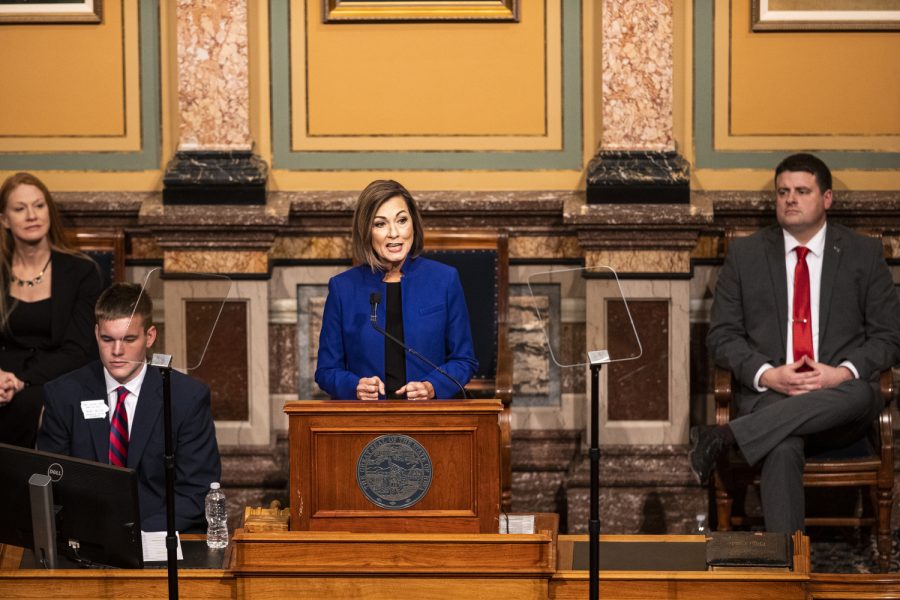Opinion | Newly signed bill puts Iowa education at risk
Iowans must organize to prevent our public education system from suffering.
Gov. Kim Reynolds delivers her 2023 Condition of the State speech at the Iowa State Capitol in Des Moines on Jan. 10, 2023.
March 1, 2023
Gov. Kim Reynolds’s School Choice bill will worsen the quality of K-12 education in Iowa.
The bill was signed into law on Jan. 24. The law allocates $345 million annually to fund private K-12 schools across the state, creating educational saving accounts for every family, and setting aside $7,600 for tuition.
With disproportionate funding going toward private education, the School Choice bill underlines inequalities in Iowa K-12 systems that have worsened public education.
Iowa joined a host of other Republican-led states that are imposing K-12 reform. The newly signed laws come as a response to critical race theory becoming ever more present in the K-12 classroom.
With Reynolds having been recently reelected as state governor, residents of Iowa must wait through at least four years of having the bill in action. In the meantime, Iowans should organize to prevent the law from negatively impacting K-12 education.
The focus of the School Choice bill is to allow parents the option of sending their children to a private school regardless of their residency or income level. Public school enrollment is expected to drop by more than 10,000 in 2027.
The bill allocates $1,205 to public schools for every student within the school district that enrolls in a private school, but this is not a reasonable compensation. Only a fraction of the overall funding goes to disadvantaged schools, as there is no income limit to the $7,600 ESA, meaning wealthy families receive extra money for tuition they could have comfortably paid.
Public schools in rural areas are at greater risk of harm, as a loss of enrollment will be far more significant to their relatively small student populations.
As rural Iowa continues to see decreasing populations and poorly funded public education, the bill presents rural families with the opportunity to send their children to highly-rated private schools in metro areas. The majority of private schools are religious institutions with curricula that differ greatly from that of public schools. Rather than presenting freedom of choice toward education, the bill strongly encourages private and religious education.
Statistics show that Iowa’s funding for public education has been falling behind since 1990. By continuing to promote private education and allocate funds toward the education of wealthy people, the School Choice bill is not presenting any change, but rather reinforcing persistent inequalities within Iowa education.
I believe Iowans must organize to fight for a just and effective K-12 school system.
I am not against the reform of K-12. I believe K-12 education in this country, whether public or private, is systemically and fundamentally flawed. I am not alone in believing that change must be made.
Despite differences in political opinions, I think a few things all Iowans can get behind are improved education, greater availability of resources, and greater allocation of funds toward the people who need it.
For me, it is fundamental that Iowans set aside their differences to form groups that are willing to discuss and fight for the improvement of education.
We need politicians who are willing to tackle this issue. Politicians should be familiarized with every form of schooling in every part of the state to understand how they function and how they can all be individually improved.
By getting together and finding a common goal, Iowans can find a way to reform K-12 education.
In the meantime, the School Choice bill is adding to Iowa’s educational crisis.
Columns reflect the opinions of the authors and are not necessarily those of the Editorial Board, The Daily Iowan, or other organizations in which the author may be involved.














